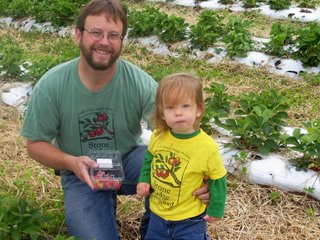Organic Schmorganic

That’s right, organic schmorganic; it’s the title of our new blog. We’ll try over the course of time to debunk any and all misconceptions that organic produce is better than local, sustainably grown farm products. Just to be clear, we’re not out to deride anyone who grows local organic produce—in fact we’re big supporters and consumers of organic produce—we just don’t feel it is any better than local sustainably grown farm products, especially when that organic food is grown somewhere else in the world other than here. More importantly, we feel many in the produce biz are misrepresenting organic farm products and their value to consumers and the environment alike—and it has to stop. We’re here to stand up for sustainably grown local produce as the only real choice for people that like to eat. We’ll start by debunking a few misconceptions.
1. ORGANIC IS NOT ALWAYS LOCAL. Much of the organic produce we see and buy in supermarkets is grown a long way away from where it is consumed. Not only is an incredible amount of energy used to grow it and get it to you, but the money used to purchase that food goes out of the community. And because it is not local, the impact on local communities is immense: diminished economies, loss of open space, disconnection with where food comes from, and increased food safety issues.
Local by default is, of course, well, local.
2. ORGANIC IS NOT NO-SPRAY. Despite what anyone tells you, almost all produce gets sprayed to some degree. In organic production, many of the products used are just as noxious as those used in regular agriculture. The big difference is that organic pesticides are “naturally” derived versus synthetic. In sustainable farming—what we practice in Stone Ridge—we choose our pest control materials not based on production method, but based on their impact on the overall environment, or orchard ecosystem. We choose ecosystem health over ideology.
Many consumers of organic food believe their food has never been sprayed. I hate to tell you this, but it probably has. Local isn’t no-spray either, but it has never passed itself off as something it is not. We feel the best way to know how your crops are grown is to know the farmer, not the sticker.
3. ORGANIC IS NOT WARM AND FUZZY. Over the past few decades, large corporate farms have taken organic farming to a multinational corporatized level. Most of the organic produce we see and eat is grown on huge farms, requiring large tractors, and a massive amount of resources. Sure, it may be organic according to the USDA….but is this how we want our food grown? Wouldn’t you rather be outstanding in a field or orchard with your local farmer discussing how your fruit is grown, rather than eating a refrigerator full of BTUs that’s most redeeming quality is that is certified OK by the USDA?
Local farming is not warm and fuzzy either, but it is real. It is real because you can visit, talk to, and shake the hand of the person that grows the food you’re about to eat. At the end of the day our tractors get stuck and we’ve got mud on our boots. We’re real people, growing real food, on real soil…in yours, ours, everyone’s backyard.
4. ORGANIC IS NOT ALWAYS ORGANIC. Over the decades, many people have worked hard to develop the organic farming industry into the fastest growing sector of the produce industry. Its sales still pale in comparison to sales of conventionally grown produce, but that could easily change in the next few years. In order to take advantage of this hot trend, many, especially on the less scrutinized ends of the spectrums, are passing off non-organic as organic in hopes that no one will notice.
I get asked on a routine basis if our produce is organic. I try and explain how to tell whether something is organic (USDA certification emblem) and why ours is not, and can’t be in our climate. I then talk about how our products are sustainably grown. What’s that, they say? It’s like a jigsaw puzzle, I respond. Every piece represents a part of our farm. If we can exchange a “conventional” piece for an organic piece, we do. Even though we may only ever get to 80% of an organic puzzle, at least we’re making progress and bringing you good, safe, local food at the same time. Most importantly, we’re telling you like it is. We’re not organic and probably won’t ever be. What we are is honest.
We don’t pretend to be saints or saviors…we’re farmers. Farming is hard work, and we work hard at it. Sometimes we need a little help. As stewards of the land, we seek out the most environmentally sensitive methods for making sure your food is good and safe to eat, and that the peaches don’t rot on the trees. As I have said before, local IS your backyard. Buy local. It benefits everyone, especially you.
Labels: farm producgts, local farming, locally grown, sustainable agriculture



